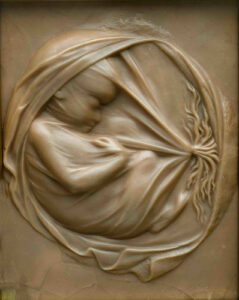Inconvenient for Pagans (Not a Political Crisis but an Historical Event)
On the Proposal That the Culture Is Not Collapsing, It Is Gone | Part 3
It seems important to take seriously the idea of a cultural revolution, since people remarking on our time repeatedly tell us that we are experiencing one – important, that is, to ask what a cultural revolution is, when it is accomplished, and whether, therefore, it has occurred. It seems just as important, also, to notice that the ‘Western’ people who have undergone such a revolution (and appear to have lost their culture) are also found outside the United States.
I am reaching the conclusion that to acknowledge this (should you have encountered enough evidence to warrant such a thought) is to come around to the view that the trouble that marks our age is not (as we have tended to think) either political or national.
 Some have suggested that we are suffering the trouble that James Madison warned of in Federalist No. 10: the misery inflicted on the country by factions that hide agitation for their own particular interests under the cloak of either a culture war (if you blame the division and polarization on the right) or progress, compassion for the marginalized (if you attribute it, as conservatives do, to the left). The question is whether what is driving these things are interests. To many on the left, Himmelfarb noted,
Some have suggested that we are suffering the trouble that James Madison warned of in Federalist No. 10: the misery inflicted on the country by factions that hide agitation for their own particular interests under the cloak of either a culture war (if you blame the division and polarization on the right) or progress, compassion for the marginalized (if you attribute it, as conservatives do, to the left). The question is whether what is driving these things are interests. To many on the left, Himmelfarb noted,
the ‘culture war’ appears to be little more than a fantasy invented by overwrought intellectuals.
Gertrude Himmelfarb, One Nation, Two Cultures
(New York: Vintage Books, 1999), 148
Is that the case? Is there nothing real or significant at issue? Is the overturning of Roe v. Wade, for example, the act of right-wing justices serving their own interests? Or is it, rather, the kind of issue that Abraham Lincoln described, when he said, on a different matter,
The real issue in this controversy … is the sentiment on the part of one class that looks upon the institution of slavery as a wrong, and of another class that does not look upon it as a wrong.
Abraham Lincoln, Seventh Joint Debate at Alton, in Political Debates Between Lincoln and Douglas (Cleveland: Burrows Bros., 1897)
That is, are the issues that are mocked as ‘culture war’ nonsense benefits that accrue to a group, or are they the kind of concern that “one class” – by which Lincoln meant one kind of person – has to address in the very way he does if he is to face himself in the mirror, to live up to his own ideals: for this person to be what he, or she, is, to act as his or her conscience dictates? (Regarding his act of emancipation Lincoln wrote,
I claim not to have controlled events, but confess plainly that events have controlled me.
Abraham Lincoln, Letter to Albert G. Hodges, 1864)
This is not trouble between factions but, we might say, trouble between cultures, or peoples, two cultures or peoples generated by the movement of history, one turning against the other – historical trouble.
 Conservatives have pointed out repeatedly that when modern man rejects moral absolutes to become the arbiter of right and wrong, this just frees him to pick who has the dignity of a person, and who is not even a person. People who do this, because they think in this way, exist; they are certainly not us, but this is their conviction. As the foil to every people, there is a barbarian. Are barbarians to be described as a faction, or are they too a people acting according to their conscience (degraded and poisonous as it may be)?
Conservatives have pointed out repeatedly that when modern man rejects moral absolutes to become the arbiter of right and wrong, this just frees him to pick who has the dignity of a person, and who is not even a person. People who do this, because they think in this way, exist; they are certainly not us, but this is their conviction. As the foil to every people, there is a barbarian. Are barbarians to be described as a faction, or are they too a people acting according to their conscience (degraded and poisonous as it may be)?
On the question of factions, consider that other age of cultural revolution in history, late antiquity, when Christianity took over the Roman empire. Was the rise of Christians in a pagan world the agitation of a faction, or was it the rightful emergence (inconvenient for pagans) of an entire culture? Would Madison really have called the governance of the empire on Christian principles the hijacking of the empire by a ‘faction’?
By a faction, I understand a number of citizens, whether amounting to a majority or a minority of the whole [Christians in the fourth century were a minority], who are united and actuated by some common impulse of passion, or of interest, adverse to the rights of other citizens, or to the permanent and aggregate interests of the community….
James Madison, “No. 10: The Union as a Safeguard Against Domestic faction and Insurrection” (1787), The Federalist (University of Chicago, 1952), 50
[]
What we are suffering is the agony of an unforeseen cultural change of direction, an historical change in the chronicle of civilization that has seen the emergence of Westerners (a great many of them) who repudiate the world-view and the principles of the culture they inherited. They did not appear overnight.
The difficulty we are now in was caused not just by the appearance of such people but by the behaviour of those they appeared among, who made a habit of trading away their own birthright for gains, we might now reckon, amounting to a mess of pottage. The West has made a painfully sharp turn that we – very much like fifth-century pagans, with their dominant numbers and highly developed culture and venerable thousand-year tradition – were in no way prepared for, a kind of change that Madison did not and genuinely could not anticipate.
A writer in Germany goes so far as to say that
Something is coming to an end. Western Euro-American culture is deeply unsettled.
Thomas Steininger, “We Are Suffering From a Wisdom Famine In the West,” Evolve Magazin 28 (2022)
He is right to put Europe and America (and presumably Britain, Canada, and Australia) into the same formula, but what he describes as an ‘unsettled culture’ is not an unsettled culture but a situation in which there is, roughly speaking, a single dominant culture conceived to generate particular goods, a culture happily embraced by those who want such goods but foisted on everyone else – in fact, on another people whose own culture stands in ruins. (Again, what are these ruins? What are the signs of a ruined culture?)
What is “coming to an end” (or has just gone the whole mile and done so) looks to be an historical era marked, just as that European writer suggests, by the reign of a culture.
Our troubles no doubt have a political dimension but to see them in political terms just utterly fails to fathom their character and challenge. Nothing is more absurd than to think that we could ‘take back the culture’ by putting our man or woman in the White House (or, if we are not Americans, our corresponding box). No one is fool enough to believe that. But if we actually possessed this wisdom we might also be moved to stop feeding the voracious political parties – all of them, even the alternative parties (like the People’s Party of Canada) that promise not to be like the impotent clones: all are happy to dine out on a crisis they are both unequipped and disinclined to understand.
(Unequipped because lawyers do not do history; disinclined because understanding requires attention to the whole picture – meaning attention to people who will never vote for you, which is something the politician does not have it in him to give.)
It is the whole picture drawn by history – that is, generated by the behaviour of our forebears facing the lure and complexity of ideas under the impetus of their own hearts – that demands attention, the picture of two cultures.
To propose that something is ending and stop at that is to entertain half a thought, as necessarily you are suggesting that something else is beginning. The thing beginning is the reign of the replacement culture: the cultivation of its own ever unfolding ‘life’ and the serious predicament of the people who are injured by this because they are ‘cultureless’.
Part 4 coming on 3 January



